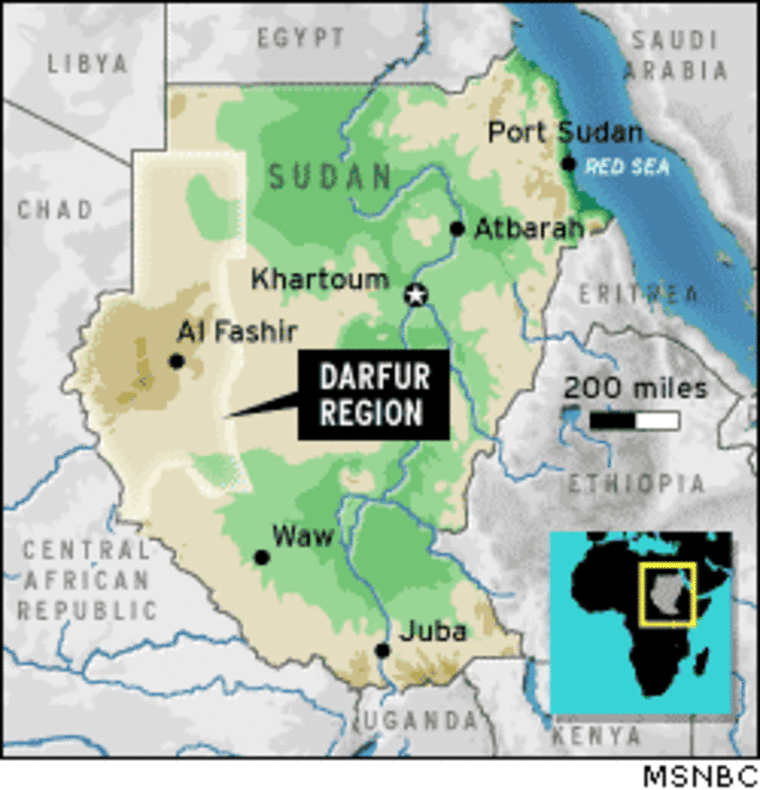The African Union’s Peace and Security Council voted Wednesday to boost the number of peacekeepers in Sudan’s Darfur region and send a contingent of civilian police to monitor efforts to end violence that has driven more than 1.5 million people from their homes.
The Peace and Security Council approved the increase in the size of its force in Darfur from 390 to 3,320 troops and civilian police, said Said Djinnit, head of the 16-member council.
The force will include 450 unarmed military observers, a major increase from the 80 who are currently deployed there to monitor a shaky cease-fire between two rebel groups fighting government troops and allied militia.
The observers have been protected by an armed security force of 310 troops. That force will be increased to 2,341. The new mission will also include 815 civilian police officers and 164 civilian staff, Djinnit said.
The $220 million, one-year operation will be funded mainly by the European Union and the United States, Djinnit said.
Tens of thousands killed
Darfur’s troubles stem from long-standing tensions between nomadic Arab tribes and their African farming neighbors over dwindling water and agricultural land. Those tensions exploded into violence in February 2003, when two African rebel groups took up arms over what they regard as unjust treatment by the government in their struggle with Arab countrymen.

An estimated 70,000 people have died since the conflict broke out, according to U.N. figures. Nearly 1.5 million more have fled to refugee camps.
U.S. Secretary of State Colin Powell said in July that Sudan’s government and allied Arab militia, the Janjaweed, had committed acts of genocide against Darfur’s non-Arab villagers.
The United Nations has begun investigating possible war crimes in Darfur, but no other government besides that of the United States has called the situation in Darfur a genocide.
“Abuses are still taking place,” said Jean Hilaire Mbeambea, Cameroon’s ambassador to the African Union. “There is mass suffering, but it is not genocide.”
Militia leader convicted
Meanwhile, a Sudanese official said authorities in Khartoum had handed down their first known conviction against a Janjaweed leader.
Mohammed Barbary Ahab el-Nabi, an Awalad Zeid tribal leader in the western town of el-Geneina, was sentenced last week after being found guilty of “looting cows and burning properties” in the village of Dory Monkish, said Abdel Moniem Taha, director of human rights at the Sudanese Justice Ministry. Sudan is under international pressure to crack down on Arab militiamen blamed for attacking African villagers in Darfur.
Taha told The Associated Press that police arrested el-Nabi on Oct. 4 and that a judge sentenced him to three years in jail and fined him $39,000. El-Nabi was given 15 days to appeal.
‘Peacekeepers,’ not ‘troops’
The 53-member African Union calls the new mission a “peacekeeping force.”
The force’s new mandate stipulates that it must “protect civilians whom it encounters under imminent threat,” although “it is understood that the protection of civilians is the primary responsibility of the government of Sudan.”
The African force, however, has not drawn up the specific rules of engagement, Djinnit said, adding that those “are to be further discussed.”
No exact deployment date was given, but Djinnit said African Union officials “hope to have the enhanced force in the region by the end of this month or very early next month.”
The force is intended to build confidence between warring parties as they negotiate an end to the 20-month conflict. The troops will create a “secure environment” for distribution of humanitarian aid to those affected by the conflict and encourage people to return to their homes, Djinnit said.
The force will monitor the security of those who fled their homes, check on any attacks by pro-government Arab militia, observe the disarmament of the militia and investigate cease-fire violations, Djinnit said.
The enlarged force was approved a day before the Sudanese government and Darfur rebels were to resume peace talks in Nigeria, where the two sides were expected to discuss security arrangements to allow refugees to return home and aid workers to operate without hindrance.
During earlier talks, which broke down last month, the government and rebels agreed to give aid workers free access to people affected by conflict. But one rebel group refused to sign the deal until other security issues were resolved.
Djinnit said the 2,341-member force was adequate for the region, which is the size of Iraq.
“The size of the mission is appropriate, given the level of where we are in the peace process, given the conditions in which we are operating and given the mandate and task of the mission,” Djinnit said.